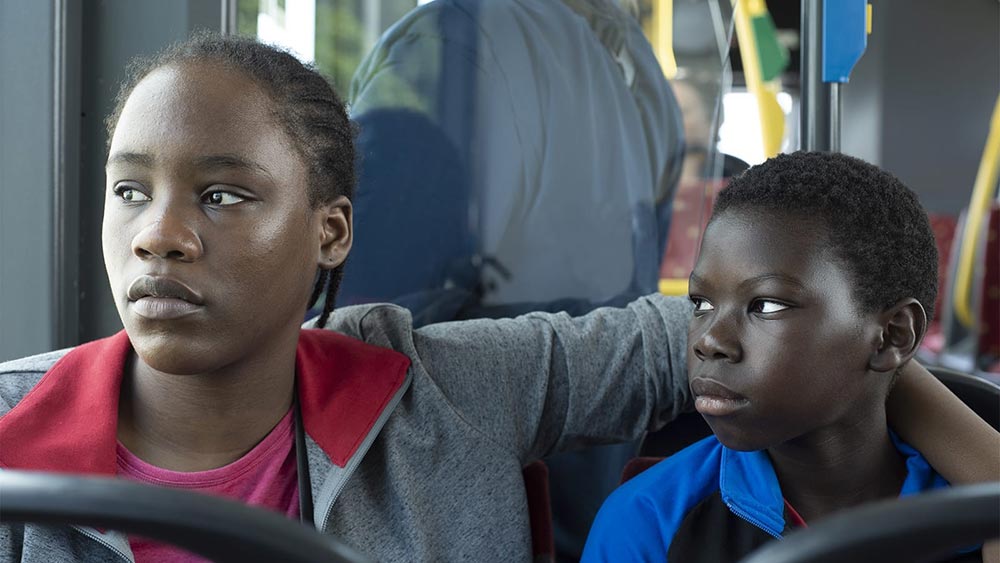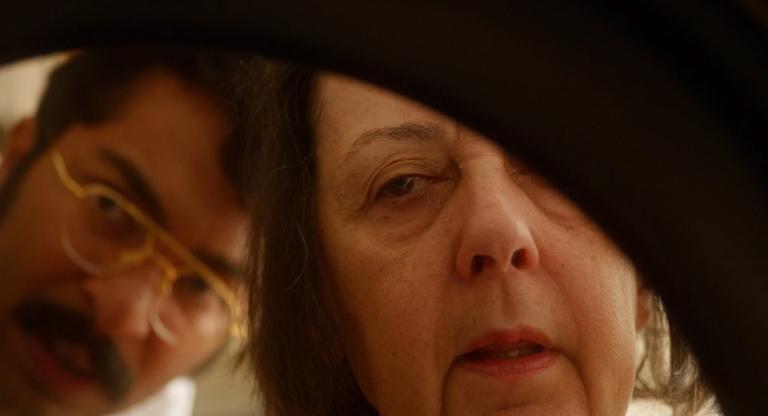Jean-Pierre and Luc Dardenne have been creating elegantly simple films about society’s marginalized and downtrodden for almost five decades. The Belgian brothers, who began in documentaries in the late 1970s, turned to narrative and achieved international acclaim with 1996’s La Promesse, and have continued to produce powerful humanist works like Rosetta (1999), The Son (2002) L’Enfant (2005), and The Kid With the Bike (2011), earning a reputation as some of Europe's preeminent cinematic naturalists.
Often somber (at times veering into grim), scoreless, handheld, minimalist affairs, the Dardennes’ films refuse to shy away from the realities of exploitation for the world’s most vulnerable. Their camera moves with unflinching persistence along the fringes of society, showing us—often from behind their characters’ heads—moments of both kindness and brutality. Their latest, Tori and Lokita (2022), is no exception. The film tells the story of two young African migrants in Belgium, Tori (Pablo Schils) and Lokita (Mbundu Joely), who must rely on each other to survive. Like the Dardennes’ previous work, Tori and Lokita includes moments of human tenderness, as we witness the unbreakable bond between its two main characters, but the film is also a cry for compassion in a time of accelerated dehumanization, presenting a devastating, ground-level vision of just one tragedy from Europe’s ongoing migrant crisis .
The Dardenne brothers took time to speak with me about their latest film and how making fiction films gets you two hotel rooms.
Chris Shields: What was the genesis of this latest film, Tori and Lokita?
Jean-Pierre Dardenne: The genesis was some reports in newspapers. We read some articles in the press and in a magazine that had to do with an inquest of children that were coming over, unaccompanied migrant children. And there were hundreds and thousands of them that were disappearing. Nobody really knew where they disappeared, but they theorized that they were disappearing into criminal and drug networks and that many, many of them were actually dying. And that revulsed us so much, that's what started us off thinking about doing this film.
CS: How does research like this become a narrative? What is the script-writing process?
Luc Dardenne: We had started a script and a film that we were thinking of doing some years back in 2008, which had to do with a mother who came with two children. She was exposed, and she told her kids to go to the police station and say that they were alone, so that they would be sent to a minor registry center and taken care of. And that's where we had started, with that sort of thing, some years back.
We wanted to underscore the friendship. The mother with the two kids who told them to go to the police, she said to always stick together. Immigrants can't make it unless they stick together. So don't separate, always stick together. And we stayed with that idea. We wanted to have a friendship where even if it ends badly, there was never a question of betrayal.
CS: This was the first time you had two inexperienced leads working together. Can you talk about what it was like?
JPD: Usually, when we're working with inexperienced non-actors or previously unexperienced performers, we try to avoid showing them how to do something. The danger is that [if] you show the inexperienced person how to do something they're then going to fall into imitation rather than incarnating the character and translating it through organically. Usually in previous films, we had experienced actors [working] with non-experienced or new people. They sort of played against each other and we didn't really show things. Now with these two actors, we said, OK, we have to go against what we usually do. I have to add that these are young actors; they're not just non-experienced, they’re young. So we started to show them, and we found that, to our delight, they were actually able to incorporate what we showed them and to adapt it: to ingest it and to adapt it to their own rhythms. So that's how we ended up working with them. Then pretty quickly we were able to do what we always do with actors, once they were able to do that, we could give them their markings and where to move, et cetera.
CS: They're both excellent, incredible performances. A more general, perhaps philosophical question, but in light of your body of work: why realism? What can it achieve?
LD: To a certain extent— I mean, it's art, and it's not entirely a conscious decision. Sometimes it's sort of beyond, in another sphere, I mean above our heads. But I think our attention to life, to details, to people that are excluded and to people that we love and we want to give them back, in a way with our films, a certain individuality and dignity. Our realism is not that we're trying to copy reality. We're trying to tell a story. We're trying to reveal the conditions that these people are living in, how marginalized they are. And through that, we bring them, rather than being on the margin, we bring them to the center of the frame so that the public may be able to see them differently, empathize more, understand them more, and see them, sometimes for the first time. Humanity is in these excluded people, at least it is for us. That's where we find it in our current world these days. That's where you find humanity.
CS: Your camera has a certain approach: the long, unbroken take without conventional closeups, coverage, et cetera. What is your philosophy for your camera?
LD: First of all, we try to keep things simple. No virtuosity, really simple. If we have one shot straight on, and if we do a little traveling, OK, but very, very low-key, simple, and then we go from there.
Now, the other thing is we never want to be ahead of our characters. We always want to be a little bit delayed, a little bit behind our characters. And the fact that we're a little bit behind our characters allows surprises to happen and to exist.
The third thing is that we stop sometimes. It's a gross generalization, but in a sense we're trying to, by stopping and just seeing the face, we're trying to pierce a mystery in the person. You know: Who is Tori? Who is Lokita? Who are any of these characters? So that you're sitting there going, Who are they really? They don't say anything. We don't give them any kind of indication of how they should react or not. They just look.
We try to play on continuity and discontinuity. If you're filming, you have to follow the action. But then you stop and you have this sort of stillness, and you have them function together.
I guess, in regard to what you would call long takes or sequential shots— In the first take with Lokita being interrogated, we see her, and we see her struggling, and we see her almost crying, and we see her answering, and we hear the voice of the person questioning her. However she may be seeming to react, we're seeing other things in her face, and this is what we want. We want to discover things that are not actually necessarily scripted, that are coming out of her face. In order to experience that, it has to be a long take. If you did it in just a short take, you can't capture all of that.
CS: When did you realize you would be creative partners for life?
JPD: [pointing downward] Now. [laughs] Before we hoped to work single, but that's our destiny. I don't know. It started when we were with a theater director, Armand Gatti, who was kind of our spiritual father, and we were brothers, and he saw us as being brothers in work as well. And I think that's what started it. We just started working together and it just kept going. We saw things on a step-by-step basis. We didn't know where we were going with this.
CS: And what about your transition from documentary to fiction filmmaking?
LD: When we did our documentaries and we’d go to a festival, they would give us one room with two single beds. And when we started to do fiction films, they gave us each our own room. We continued with fiction. [laughs]
Tori and Lokita opens tonight, March 23, at IFC Center. Directors Jean-Pierre and Luc Dardenne will be in attendance for a Q&A.



